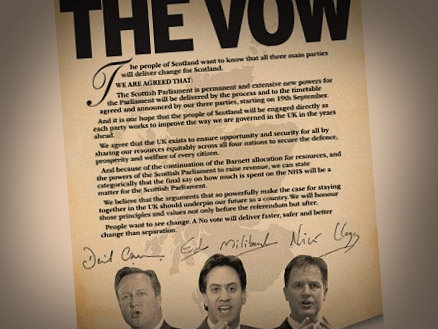If you had switched on your television in the middle of the night you would have thought that Yes had won by a landslide. “An historic turning point in British history…” “The impetus towards radical change is now unstoppable…” “Nothing will ever be the same again…” drivelled politicians and commentators in unison.
It seemed they were using the soundbites prepared for a nationalist victory and grafting them onto the decisive rejection of nationalism. In the view of the political class and so-called opinion formers, if you voted Yes you were opting for radical change (true); if you voted No you were … er… voting for radical change.
“The status quo is not an option” is the weasel maxim favoured by those who have never abdicated their entitlement to act as infallible interpreters of the wishes of the British public. In reality, the British public’s rejection of “Westminster” is not a repudiation of our unwritten constitution but of the scoundrels of the political class.
Are we seriously to believe that all of the 2 million Scottish No voters rejected the status quo? The offer of radical constitutional change only came in the closing stages of the referendum campaign when narrowing polls caused by a temporary emotional spasm panicked Unionist politicians.
Gordon Brown, who has never ceased to regard himself as the rightful Prime Minister of Britain, scribbled a revolution on the back of a fag packet and decreed its implementation. How many people voted No because of the seductive dog’s dinner of half-baked pledges offered as “The Vow”? Perhaps 100,000? Be generous and suppose it was 200,000. Possibly it was hardly anyone.
At any rate it is totally plausible to argue that as many as 1.6 million Scots – the equivalent number to the Yes vote – voted No mainly to save the Union, with only a peripheral interest in increased fiscal powers for the Wee Scotch Senate at Holyrood.
Why is it, then, that the wishes of the 1.6 million defeated separatists trump not only the Scottish Unionist majority but are considered a “mandate” to wreck the historic constitution governing the rest of the United Kingdom’s 36 million voters, without even consulting them? Does Dave seriously believe he can get away with an extravagant coup d’état, to be executed over the heads of the UK electorate via draft legislation by the end of January?
The hysteria is extraordinary. There is no political parallel. Who can remember when a party that won a convincing victory in a general election felt obliged, with indecent haste, to implement half of the policies of the defeated party? How much longer can less than half of the Scottish tail be allowed to wag the UK dog?
Of course, the underlying reality is that the political class and the complicit commentariat are only too willing to embrace the hysteria for change. For politicians it offers the prospect of proliferating legislative bodies, more jobs, salaries and expenses. For the media it guarantees a generous supply of “stories”, crises, rumours and headlines.
Even while the Scottish referendum votes were still being counted, the feeding frenzy for “change” was galvanising the television studios. Most extreme were the Liberal Democrats, flogging their familiar dead horses of UK federalism and even that jaded distraction, House of Lords reform. Bold stuff, coming from a party with a life expectancy of eight months.
The obsessive constitutional tinkering began with the neophiliac Tony Blair in 1997. By 1999 he had created a Scottish parliament and the wise and farseeing George Robertson (later head of Nato – be very afraid!) solemnly pronounced that devolution would “kill nationalism stone dead”. By 2011 that nationalist corpse had secured majority governance of Scotland.
The “unacceptable status quo” of today, just 17 years ago, was regarded as a final and lasting constitutional settlement: the “settled will of the Scottish people”. Today it is being denounced as if it were some anachronistic imposition inherited from the days of Robert the Bruce.
For how much longer can Scotland and the wider United Kingdom tolerate the relentless drift to ever more fissiparous divisions? How much more appeasement are we to throw at the defeated nationalists before English frustrations boil over? Because of the cack-handed conduct of Unionist politicians – while Scotland was drifting dangerously close to secession, Dave’s preoccupation was to impose same-sex marriage against the will of his own party – wild and incoherent promises have been made that, as a matter of political realism, must in some degree be redeemed.
But to rush to reconfigure the UK constitution to appease a defeated faction, within a matter of months and without electoral consultation, is unacceptable to English voters. The constitutional structures of the United Kingdom cannot be radically demolished on the hoof. Cameron has proved his incapacity to be prime minister; this latest debacle confirms that perception. This crisis of incompetence could bury the Tory Party. UKIP’s hour may have come.

COMMENTS
Please let us know if you're having issues with commenting.